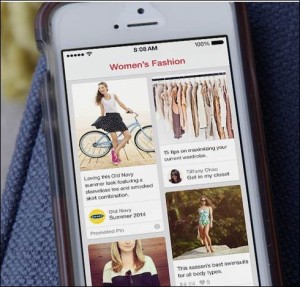
Pinterest®, since it first appeared on the scene in 2010, has been the darling of crafty do-it-yourselfers (DIYs), ambitious brides-to-be, fitness aficionados, foodies, and anyone else interested in creating their own little portfolio of images carefully curated from sites around the Internet. Pinterest has consistently presented itself as a tool that could be used by consumers for a natural, authentic experience, giving users full artistic and creative reign as they pinned images and designed boards. In fact, Pinterest has been notorious for cracking down on advertisers who use its offerings in any sort of spammy way, including now prohibited “Pin It to Win It” contests. The site has also received considerable attention for the thorny legal issues that are implicated by its “pin anything you want” philosophy, including copyright, trademark and right of publicity issues.
Despite Pinterest’s popularity, advertising in the form of sponsored and promoted pins has been noticeably absent from the Pinterest world—in marked contrast with both Twitter® and Facebook®, which integrated sponsored advertisements into their platforms some time ago. So, while advertisers have been posting pictures of their products and sweepstakes or contests (the reason for Pinterest’s Guidelines in the area) on Pinterest for several years, there has not been actually been any money changing hands. But it looks like all of that is changing. Based on testing Pinterest has been conducting since May 2014 and upcoming changes to Pinterest’s Privacy Policy, which will take effect on October 19, 2014, it seems like “Promoted Pins” will soon become a regular feature on the Pinterest platform.
While the advent of Promoted Pins offers new opportunities to advertisers and marketers who can tap into the tens of millions of people who use Pinterest, Pinterest wants to make sure its Promoted Pins are “tasteful, transparent, [and] relevant …— so that Pinterest continues to be a great experience for everyone.” To ensure that happens, Pinterest has provided advertisers with surprisingly specific Advertising Rules and a new Privacy Policy to help facilitate this transition. These Advertising Rules are applicable to Promoted Pins “and other promoted content associated with Pinterest.”
Pinterest’s Advertising Rules address everything from the content of advertisements to types of marketing to the destination landing pages, and explanations often provide considerable detail on the whys and hows to implement the rules. Generally speaking, the rules make it clear that deceptive and misleading advertising of any type is prohibited, and require disclaimers of affiliation with Pinterest. Additionally, much like Facebook’s recent change in its policy for developers, Pinterest prohibits any incentives that provide money, prizes or deals in return for users clicking on site buttons (and thus unduly influence user behavior). There are many rules and there are detailed, but here’s a sample of some of the more significant ones:
1. Pin image: Advertisers may not put any of the following in a Promoted Pin image:
- Promotional material, discounts or sales, unless the full dates for the promotion are clearly articulated (for example “Sale lasts Sept. 1-30, 2014”)
- Commercial and functional calls to action (e.g., “Buy now,” “Make money from home,” “Save!,” “Click here!,” “Pin this,” “Repin now”)
- Prices (unless they use Rich Pins);
- Improper grammar, excessive symbology, or multiple hashtags
- Confusing design elements
- Product or service claims (e.g., “Guaranteed to help you lose weight” or “Reduce wrinkles in 12 days!” or before and after beauty/weight loss photos)
2. Pin descriptions: Advertisers may not put any of the following in their Promoted Pin’s text description:
- Promotions, sales, or events without full dates;
- Prices (unless they use Rich Pins);
- Improper grammar, excessive symbology or multiple hashtags; or
3. Destination landing pages: Advertiser’s landing page (the place the Promoted Pins link to):
- Shouldn’t have email sign-up requests or similar design elements that block content
- Must comply with the Pinterest Acceptable Use Policy and these ad rules
- Should contain content relevant to the ad
4. Products and services Pinterest won’t promote: Ads may not promote:
- Adult products and services
- Alcohol
- Imitation or counterfeit goods
- Drugs and tobacco
- Products from endangered or threatened species
- False documents
- Online gambling and lotteries, or games of skill
- Illegal activity
- Malware and hacking
- Pharmaceuticals and supplements
- Pinterest incentives (anything that directs people to click on Pinterest buttons to get money, prizes or deals in exchange)
- Deceptive subscription services (Note: Pinterest does not permit negative option billing subscription services).
- Unacceptable business models (e.g., penny or bidding fee auctions and payday loans)
- Weapons and explosives
In addition to categorically excluding some types of advertising and/or products from Pinterest, the Rules put the kibosh on any attempts to advertise negative option plans and any “online gambling, lotteries, or games of skill.” This last prohibition is somewhat confusing (and could be read to prohibit games of skill on the site), but appears to be intended to prohibit advertising and promoting online gaming sites. We’ll be watching to see how these rules shake out in practice.
While the Promoted Pins program is still in a testing phase, it is clear based on these changes and developments that Pinterest is gearing up to implement a fully integrated promotional offering. Whether these rules will help Pinterest maintain its “natural” user experience in the face of Promoted Pins remains to be seen. What is clear, however, is that advertisers and marketers interested in advertising via Promoted Pins should ensure that they remain abreast of Pinterest’s rules and policies relating to advertising on its platform, as the platform clearly intends to maintain a robust system for regulating promotion and claims on the site.